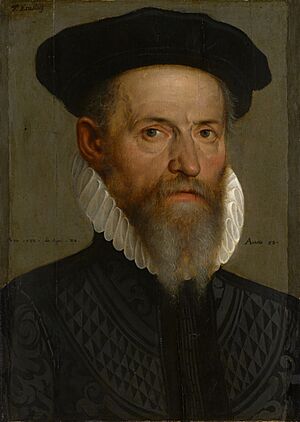Thomas Erastus facts for kids
Quick facts for kids
Thomas Erastus
|
|
|---|---|

by Tobias Stimmer, 1582
|
|
| Born | 7 September 1524 |
| Died | 31 December 1583 (aged 59) |
| Nationality | Swiss |
| Alma mater | University of Basel University of Bologna University of Padua |
| Known for | Opposition to Paracelsus Erastianism (unity between the church and state) |
| Scientific career | |
| Fields | Medicine, theology |
| Institutions | University of Heidelberg |
| Academic advisors | Luca Ghini |
| Notable students | Petrus Ryff |
Thomas Erastus (born Thomas Lüber; 7 September 1524 – 31 December 1583) was a Swiss physician (doctor) and a Calvinist theologian (religious thinker). He is famous for his ideas about how the church and state should work together.
Erastus wrote a set of ideas, called theses, where he argued that the government, not the church, should punish Christians for their sins. He believed the church should not stop people from taking part in religious ceremonies as a punishment. These ideas were published after his death in 1589. His name is now linked to a concept called Erastianism.
Life of Thomas Erastus
Thomas Erastus was born on September 7, 1524, in Baden, Switzerland. His family was not wealthy.
In 1540, he started studying theology at the University of Basel. However, a serious illness called the plague spread in 1544, forcing him to move. He then studied philosophy and medicine at the University of Bologna and the University of Padua.
In 1553, Erastus became a doctor for an important leader, the Count of Henneberg. By 1558, he was the doctor for another powerful ruler, Otto Heinrich. At the same time, he became a professor of medicine at the University of Heidelberg. He taught there until 1580.
Otto Heinrich's successor, Frederick III, made Erastus an important advisor in 1559. He also became part of the church's governing group.
Religious Beliefs
In his religious views, Erastus followed the ideas of Huldrych Zwingli. At religious meetings in Heidelberg (1560) and Maulbronn (1564), he spoke and wrote about Zwingli's beliefs regarding the Lord's Supper, a religious ceremony. He even wrote replies to the arguments of another religious leader, Johann Marbach.
Erastus tried to stop other religious leaders, known as Calvinists, from changing how the church was run. These Calvinists wanted to introduce a new system called Presbyterian polity, similar to the one in Geneva. However, Erastus was not successful, and the new system was set up in Heidelberg in 1570.
One of the first actions of this new church system was to temporarily remove Erastus from the church. They accused him of having different religious beliefs. This ban was lifted in 1575 after Erastus confirmed his strong belief in the Trinity.
Despite this, his position was not comfortable. In 1580, he returned to the University of Basel. In 1583, he became a professor of ethics there. Thomas Erastus passed away on December 31, 1583.
Erastus's Writings
Erastus wrote several books and papers on medicine, astrology, and alchemy. He also strongly disagreed with the medical ideas of another famous doctor named Paracelsus. Erastus defended older medical traditions, especially those of Galen, while still admitting that some of Paracelsus's ideas had merit.
His most famous work was published after his death in 1589. It was called the Treatise of Erastus. This book was based on 75 ideas, or Theses, that Erastus had written in 1568. These ideas were shared as handwritten copies before they were officially published.
What is Erastianism?
In his Theses, Erastus argued that if Christians committed sins, the government should punish them, not the church. He believed that the church should not use religious ceremonies, like withholding sacraments, as a way to punish people. This idea is now known as Erastianism.
Erastus believed that the government had the power to deal with all crimes, including those that might also be considered sins. He thought that excluding someone from church ceremonies was not the right way for the church to punish its members.
This idea was discussed a lot, especially during the Westminster Assembly in England. Some people there, like John Selden, agreed with Erastus. However, after much debate, the opposite view became more common. The part of the Westminster Confession of Faith that talked about church punishments was not officially approved by the English parliament.
 | Bessie Coleman |
 | Spann Watson |
 | Jill E. Brown |
 | Sherman W. White |

